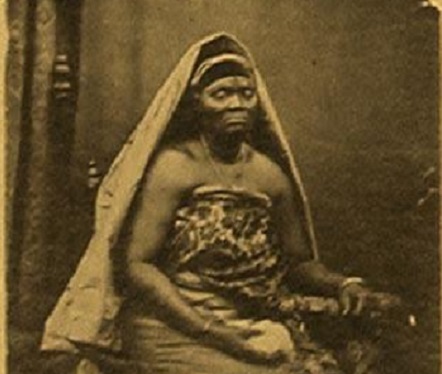Biography
Early Life
Efunroye Tinubu was a prominent businesswoman and activist in Nigeria.
She played a crucial role in shaping the politics of Lagos and Abeokuta. She was the first woman to publicly resist British colonialism.
Born around 1805 in Abeokuta, Nigeria, her father gave her the name Efunroye, and Osuntinubu was given by her mother.
The name Osuntinubu stemmed from the belief that it was the goddess Osun who gifted her from the depths of the Ogun River.
Her family adhered to the indigenous spiritual traditions of Yoruba culture. They were told by an Ifa priest early in her life that she would be abundant.
Tinubu learned valuable market skills from her grandmother, Osunsola, who was involved in the trade of roots and herbs.
Tinubu’s mother, Nijeede, was also a trader, and she passed on her business knowledge to her daughter.
These early influences laid the foundation for Tinubu’s later success as a businesswoman and activist.
Tinubu shattered societal norms and paved the way for future generations of women to emerge as leaders and change-makers.
Her position as the first Iyalode (First Lady) of Egba is due to her ability to break through gender-based limitations within Yoruba society and her exceptional leadership abilities.
With her influential position, Tinubu held significant weight in the political landscape of Lagos and Abeokuta. As the wife of a king, stepmother to another, and sister-in-law to yet another, she expertly wielded her power to shape the political destiny of these regions.
Tinubu’s strategic alliances helped install and remove kings, a crucial role in determining leadership and governance.
Political Leadership
Guided by her Yoruba principles, Tinubu took a firm political stance against British colonial interference and the invasion of foreign influence.
She adamantly defended the sovereignty and authority of Yorubaland, actively opposing British traders who sought to dominate the economic, political, and social fabric of Lagos and Abeokuta.
Tinubu actively supported exiled figures, such as Oba Akintoye and Oba Dosunmu, using her material wealth and influence to aid their struggles and protect their sovereignty.
Her unwavering political stance was an extension of her religious beliefs, which emphasized the preservation of cultural heritage and the protection of indigenous governance systems.
Abolition Activism
In her lifetime, Tinubu played a complex role in the context of slavery.
It is important to acknowledge that she engaged in the slave trade. But it is equally crucial to recognize her efforts in the abolition of slavery.
Tinubu’s approach to the treatment of enslaved individuals distinguished her from others in the slave trade.
The change in her stance on slavery stemmed from her awareness of the stark contrast between the treatment of enslaved people within her local community and the inhumane conditions endured by enslaved people in Europe and the Americas.
The eradication of slavery was a complex process that involved various factors and actors.
Although forced into exile from Lagos in 1856, Tinubu remained politically and economically influential until her death in 1887.
Her burial was a grand event spanning many days and showcased the respect and admiration she commanded from the Egba people.
Today, her legacy lives on, with Tinubu Square in Lagos, and a memorial park in her hometown of Abeokuta.

